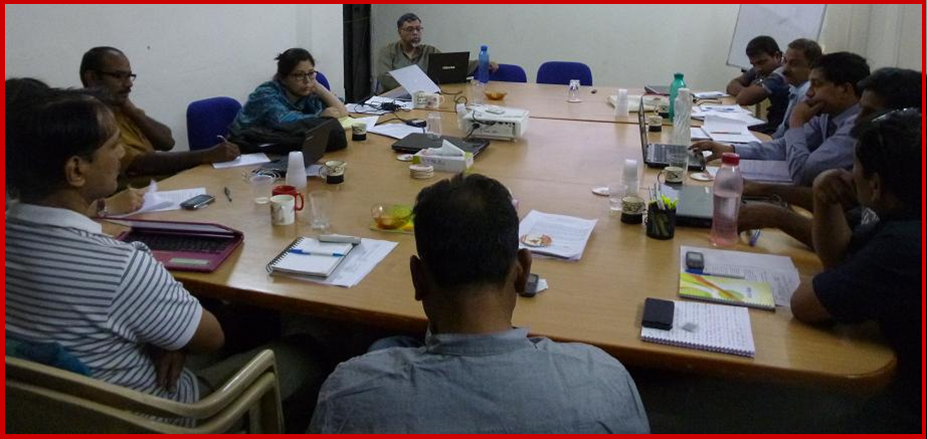
|
|
Building Solidarity - COPASAH India’s National Meeting
|
Bharti Prabhakar
|
|
The community of practitioners in health accountability in India has grown in strength and solidarity under the mantle of Community of Practitioners on Accountability and Social Action in Health (COPASAH) with significant insights and constant support from steering committee members. This solidarity has gained momentum with two international workshops on accountability and health (Mumbai workshop in February 2013 and Delhi workshop in September 2013), a regional workshop in Gujarat, and two learning exchange visits facilitated by the South Asia region.
The need for consistent support to sustain this group with continued inputs, opportunities for exchanges and growth has been expressed in several ways. Keeping this objective in view, a one-day meeting of COPASAH members who had earlier participated in the Mumbai and Delhi COPASAH workshops, was organised at the office of the Centre for Health and Social Justice (CHSJ) at Saket in New Delhi on April 22, 2014. |
Participants discussing their future plans for strengthening the network
|
Thirteen participants from six Indian states i.e. Bihar, Delhi, Karnataka, Madhya Pradesh, Odisha and Rajasthan participated in it. The key objectives of the workshop were: to facilitate discussions on some of the critical areas of perspectives among COPASAH members, decide on pathways to strengthen COPASAH and come up with ideas on how to increase the contribution as well as participation of members.
After a round of introductions, E. Premdas of CHSJ gave a brief overview of COPASAH and its process in South Asia. He noted that COPASAH is a global learning platform for practitioners of accountability in health. The members are from three regions - Latin America, South Asia and Sub Saharan Africa. The group aims to promote people-centric and health rights’ oriented practices. The platform provides for coming together and sharing experiences, knowledge and skills.
There is a gap in the exchange of knowledge between the academic researchers and practitioners. Significantly, thus one of the priorities of COPASAH is to document the field experiences of practitioners and make these available for learning and sharing, he said. Premdas informed about the data and resources available on the COPASAH website, blogs, listserv, newsletter, case studies and documented experiences of the practitioners and encouraged participants and practitioners to document their experiences and share them through these channels. “Efforts are being made to translate these resources from English into other local languages also,” he added.
The challenge however, is to let the group grow on its own as it is not getting funds from anywhere, said Premdas. He further introduced the theme of the proceeding lecture of Dr Abhijit in the seminar and said, that the lecture aimed to lay out the theoretical issues and perspectives of citizen-centric accountability.
Different Perspectives of Accountability in Health
A seminar titled, ‘Critical Accountability Issues for Practitioners of Accountability in Health’ was organised during the meeting. This learning space and process, termed as the ‘Accountability Lab’ aimed at facilitating clarity among practitioners on the various perspectives on accountability such as those promoted by the World Bank, international donor agencies and the like, vis-a-vis those promoted by COPASAH.
The seminar further laid out the theoretical issues and perspectives on accountability and this session comprised of a lecture by Dr Abhijit Das, Director, CHSJ followed by discussions. It brought forth various perspectives about accountability in health and the different expectations and experiences around community monitoring, which has become an essential tool for the health and social sector. It was analysed in the seminar, how various organisations and individuals are looking at community monitoring and how COPASAH would like to see it implemented. It was also pointed out that COPASAH’s vision focused on a citizenship paradigm, and community centrality was absolutely non-negotiable in this social accountability process.
After a round of introductions, E. Premdas of CHSJ gave a brief overview of COPASAH and its process in South Asia. He noted that COPASAH is a global learning platform for practitioners of accountability in health. The members are from three regions - Latin America, South Asia and Sub Saharan Africa. The group aims to promote people-centric and health rights’ oriented practices. The platform provides for coming together and sharing experiences, knowledge and skills.
There is a gap in the exchange of knowledge between the academic researchers and practitioners. Significantly, thus one of the priorities of COPASAH is to document the field experiences of practitioners and make these available for learning and sharing, he said. Premdas informed about the data and resources available on the COPASAH website, blogs, listserv, newsletter, case studies and documented experiences of the practitioners and encouraged participants and practitioners to document their experiences and share them through these channels. “Efforts are being made to translate these resources from English into other local languages also,” he added.
The challenge however, is to let the group grow on its own as it is not getting funds from anywhere, said Premdas. He further introduced the theme of the proceeding lecture of Dr Abhijit in the seminar and said, that the lecture aimed to lay out the theoretical issues and perspectives of citizen-centric accountability.
Different Perspectives of Accountability in Health
A seminar titled, ‘Critical Accountability Issues for Practitioners of Accountability in Health’ was organised during the meeting. This learning space and process, termed as the ‘Accountability Lab’ aimed at facilitating clarity among practitioners on the various perspectives on accountability such as those promoted by the World Bank, international donor agencies and the like, vis-a-vis those promoted by COPASAH.
The seminar further laid out the theoretical issues and perspectives on accountability and this session comprised of a lecture by Dr Abhijit Das, Director, CHSJ followed by discussions. It brought forth various perspectives about accountability in health and the different expectations and experiences around community monitoring, which has become an essential tool for the health and social sector. It was analysed in the seminar, how various organisations and individuals are looking at community monitoring and how COPASAH would like to see it implemented. It was also pointed out that COPASAH’s vision focused on a citizenship paradigm, and community centrality was absolutely non-negotiable in this social accountability process.
The lecture was followed by a clarification of terms and concepts. The challenges of social accountability and its ground reality were discussed thereafter and This was enriched by sharing of field experiences by participants.
Using Technology to Support Practitioners
A session introducing the COPASAH website and blog was conducted by Dr Bharti Prabhakar. She demonstrated the different resources and learning materials, presentations and lectures delivered at other COPASAH meetings, and global and Indian news updates, available on the COPASAH website. The COPASAH website, blog, e-mail group, Facebook page and quarterly newsletter were also screened.
An innovative online learning platform- the Resource Pack - was also introduced. She outlined that the platform has several concepts, manuals and tools to support the learning of community monitoring practitioners. The Resource Pack can also be used for training purposes. It was suggested that participants can share any tools, case studies, experiences etc for wider use and to enable exchange of knowledge.
Strengthening the Forum
Discussions ensued on how to strengthen the COPASAH learning network and platform. Virtual meeting was proposed as one of the methods of staying connected. It was suggested that regular Skype or Google Hangout meetings could be held every month, on a fixed day depending on the convenience and availability of members. In each session there could be two presentations of 10 minutes each related to field experiences of community monitoring, followed by discussions.
Lavanya Mehra of CHSJ introduced the Skype and Google Hangout as a medium to conduct meetings and discussions among members. With a view to formalise this effort of promoting sharing, reflection and learning, the following methodology was developed for implementing over the next six months:
The last session of the day focussed on strengthening of the forum of young practitioners through a practice session on use of technology and social media. Discussion and demonstration on the technical know-how and practice of Google Hangouts and Skype was also undertaken. The one-day meeting concluded with participants agreeing to stay connected and share their experiences for mutual learning. Participants were also urged to contribute through articles in the COPASAH blogs, listserv and newsletter.
Using Technology to Support Practitioners
A session introducing the COPASAH website and blog was conducted by Dr Bharti Prabhakar. She demonstrated the different resources and learning materials, presentations and lectures delivered at other COPASAH meetings, and global and Indian news updates, available on the COPASAH website. The COPASAH website, blog, e-mail group, Facebook page and quarterly newsletter were also screened.
An innovative online learning platform- the Resource Pack - was also introduced. She outlined that the platform has several concepts, manuals and tools to support the learning of community monitoring practitioners. The Resource Pack can also be used for training purposes. It was suggested that participants can share any tools, case studies, experiences etc for wider use and to enable exchange of knowledge.
Strengthening the Forum
Discussions ensued on how to strengthen the COPASAH learning network and platform. Virtual meeting was proposed as one of the methods of staying connected. It was suggested that regular Skype or Google Hangout meetings could be held every month, on a fixed day depending on the convenience and availability of members. In each session there could be two presentations of 10 minutes each related to field experiences of community monitoring, followed by discussions.
Lavanya Mehra of CHSJ introduced the Skype and Google Hangout as a medium to conduct meetings and discussions among members. With a view to formalise this effort of promoting sharing, reflection and learning, the following methodology was developed for implementing over the next six months:
- Skype meetings to be conducted once in two months, and to comprise seminars on practice of accountability and community monitoring
- The fourth Saturday of every second month, starting from May 2014 , has been fixed for this meeting
- The process entails :10 minute presentation, 15 minutes of discussion and note sharing at the end of each Skype meeting
- Moderator’s responsibility - Ensure that notification for participating in the meeting is sent out at least 15 days in advance and a summary note with presentations is sent to all those participating. Moderating sessions and giving directions to the discussions as well as building on them was also laid out as an important responsibility
The last session of the day focussed on strengthening of the forum of young practitioners through a practice session on use of technology and social media. Discussion and demonstration on the technical know-how and practice of Google Hangouts and Skype was also undertaken. The one-day meeting concluded with participants agreeing to stay connected and share their experiences for mutual learning. Participants were also urged to contribute through articles in the COPASAH blogs, listserv and newsletter.
|
|
ABOUT AUTHORS
Dr Bharti Prabhakar works as Programme Officer in Centre for Health and Social Justice (CHSJ), India.
To know more about the work done by CHSJ, please CLICK HERE
Dr Bharti Prabhakar works as Programme Officer in Centre for Health and Social Justice (CHSJ), India.
To know more about the work done by CHSJ, please CLICK HERE








